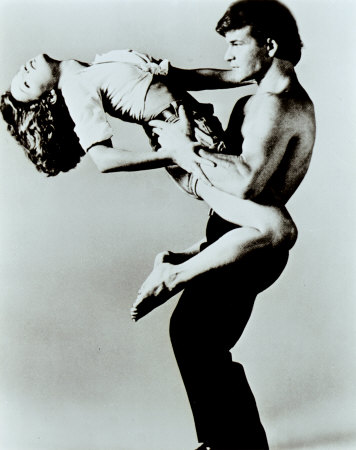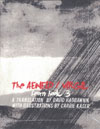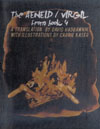What if Jim Stark, James Dean‘s character from Rebel Without a Cause, left home after the end of the movie, learned some sick dance moves, and became an instructor in a string of cheesy resorts in the Catskills? That’s essentially the character Patrick Swayze portrays in Dirty Dancing, which has been playing incessantly on the TV guide channel of our cable service for the past several days. In catching bits and pieces of the flick — getting sucked in against all reason and better judgment — I’ve come to realize what a weirdly remarkable film it is. And the fact that Swayze died earlier this year adds a touch of poignancy to seeing him in this role, arguably the one he’s best known for.
In the world of the Catskills that the film presents, there are three levels of society: the upper-crust guests and resort owners, the snobbish waitstaff who are only a few years at Yale away from joining them, and the lowly dance crew and ordinary workers who come from the other side of the tracks. The central plot point in the movie is the abortion needed by Penny (Cynthia Rhodes), the dancing partner of Johnny Castle (Swayze). Everyone from the first group outlined above believes it was Johnny who got Penny pregnant, when really it was a jerky waiter who can’t be bothered to help her.
Baby (Jennifer Grey), daughter of a doctor and guest at the resort (Jerry Orbach) steps in, secretly providing the funds for the abortion and learning Penny’s dance moves so she can team with Castle at an important gig. Amazingly, there is not a single hint in the movie to suggest Penny should not get an abortion; it’s simply taken for granted she must and will get one, even though at the time of the film (1963) it was still illegal. I doubt a film with a story like this could even be made today, though in 1987 it apparently passed without much comment.
Predictably, Baby and Johnny fall in love. But it’s not what you’d expect. Far less than being about Baby’s awakening to the liberating underground world of the dancers — an awakening that happens almost at once in the early scene when she helps bring watermelons to a late-night juke party in the workers’ shack — the story really becomes about Johnny’s quest for approval and acceptance in Baby’s world. Now supposedly, according to IMBD, Val Kilmer was originally offered the role of Johnny, and Sarah Jessica Parker was considered for Baby. Needless to say, it’s unimaginable without Swayze and Grey in these parts. Daughter of Joel Grey, who was so scintillating as the master of ceremonies in Cabaret (stage and film versions), Grey has largely disappeared after a botched nose job during the 90s.
Meanwhile, Swayze in Dirty Dancing is simply astonishing. His dance scenes have energy, agility, and a feeling of pure joy that I’ve rarely witnessed on screen before or since. It’s no accident that, as accomplished a dancer as Grey is, the floor is cleared for Swayze’s virtuoso moment in the climactic scene of the film. And the acting he’s asked to do — the lines he’s asked to deliver — alongside the dancing truly defies description. What, for example, are we supposed to make of the scene when Baby asks Johnny, as they nuzzle in bed after making love, if he’s been with “a lot of women”?
Typical of the role-reversal throughout the movie, what ought to be a moment of reassurance for Baby turns into one for Johnny instead, as he describes being “used” by an endless parade of rich women shoving keys into his hands, “sometimes several a day — different ones!” etc., the implication being that Johnny, coming from the streets and not knowing any better, mistakes their momentary desire for acceptance and access to their world. That acceptance and access, we come to find out, can only be partially provided by Baby, and ultimately must come from her father, the upright and moralistic doctor who winds up getting drawn into Penny’s abortion fiasco.
This is where, I think, the film channels Rebel, which in so many ways is about Oedipal struggles and homoerotic male bonding. While women can cross the boundaries between high and low, doctor and dancer, resort suite and worker shack, only man-to-man love can truly obliterate those boundaries and bring the opposite poles together. It’s only in the moment that Baby’s father discovers it was the devious waiter, and not Johnny, who got Penny pregnant, that he shakes Johnny’s hand and welcomes him wholly into the main ballroom world. In a larger sense, as old fogies rise to shake and shimmy with the dirty dancers, we’re meant to understand this as a watershed moment, the birth of the 60s — I guess.
Somehow Swayze is able to pull this character off, wince-worthy script and storyline and all, while somehow maintaining a sense of dignity and even grandeur. He’ll be missed.


















